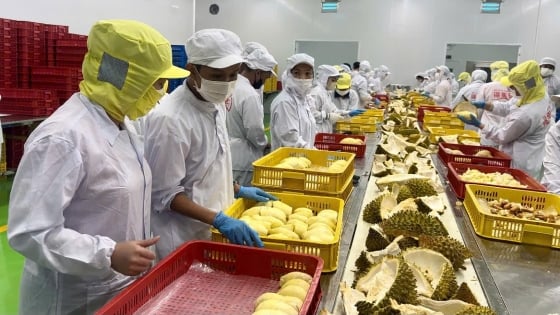(VAN) Official exportation of frozen durian to China would bring 20% increase to this product line. So, the combination export outputs of fresh and frozen durian to this market would reach more than 80%.
Note from the Editorial Board: During the visit of General Secretary and President To Lam to China on August 19, the Ministry of Agriculture and Rural Development of Vietnam and the General Administration of Customs of China signed three protocols that will facilitate the official exportation of three products to China: frozen durian, fresh coconuts, and crocodiles.
This contributes to the expansion of Vietnam’s agriculture by bolstering the exportation of agricultural products, particularly those that are stated in the recently signed protocols, to Chinese markets.
The Vietnam Agriculture Newspaper publishes a series of articles that explore the potential, opportunities, and recommendations of experts regarding the three products.
Reducing the burden on fresh fruits
Ban Me Green Farm Company’s Chairwoman of the Board of Directors, Ms. Nguyen Thi Thai Thanh, disclosed that the organization has been engaged in the chilling and peeling of durian for an extended period. Nevertheless, Vietnam has been able to sell to other enterprises because they have not yet received approval from China for official exports.
Ms. Thanh stated that the company had constructed warehouses and prepared for certification in anticipation of Vietnam and China’s agreement to execute a protocol for the export of frozen durian. Specifically, it is anticipated that the company’s freezing facility will peel nearly 10,000 tons of durian this year.
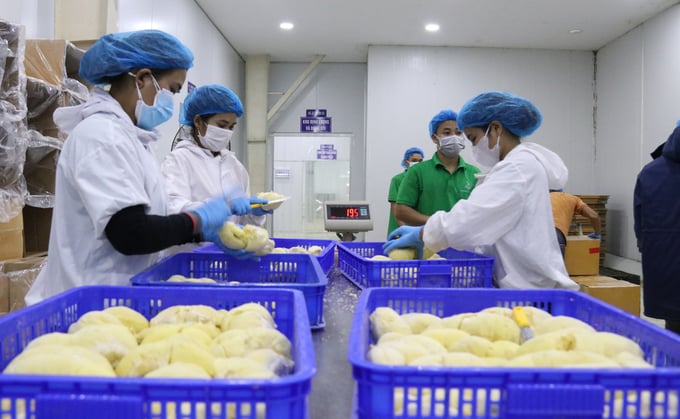
Processing frozen durian. Photo: Quang Yen.
“The quantity of peeled durian is substantial; however, it remains a negligible portion of the total production in Dak Lak province. Consequently, the official exportation of frozen durian would address numerous challenges that fresh durian exports have encountered in recent years. At present, our warehouses and refrigeration facilities have been constructed to comply with the necessary standards. Exporting frozen durian will be significantly more convenient than exporting raw fruit. This approach is superior; however, certification requirements are considerably more stringent. At present, there are approximately fifty refrigeration facilities”, said Ms. Thanh.
The industry’s long-term solution will be provided by the export of chilled durian, according to the chairwoman. In particular, the use of frozen durian will mitigate the environmental pollution issue resulting from the management of durian peel waste and prevent pests from infiltrating importing countries.
The cooperative has invested in four cold storage facilities, each spanning 5,000 square meters, with a daily storage capacity of up to 18 tons, in order to prepare for frozen durian exports, according to Mrs. Nguyen Thu Huong, Director of G1 Export-Import Cooperative.
According to Ms. Huong, the cooperative will be able to utilize durian fruits that do not satisfy the standards for fresh export by peeling and freezing them through the official export of frozen durian.. At present, the Chinese market is subject to strict regulations regarding the export of raw durian, which facilitates the management of frozen products.
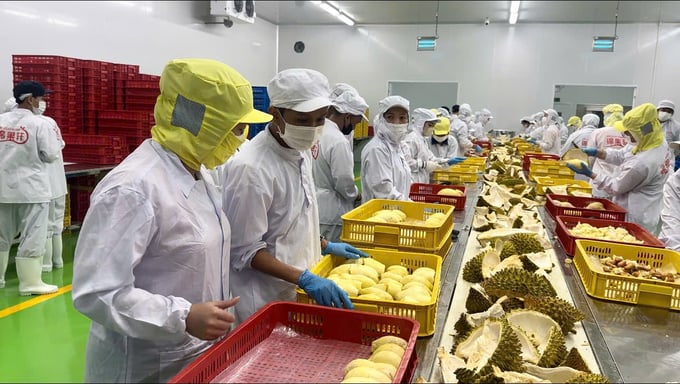
Official export of frozen durian will help reduce pressure on fresh fruit exports. Photo: Quang Yen.
In the past, frozen products were required to be routed through third parties. Therefore, businesses will optimize profits and reduce costs if official exports are authorized. In contrast to fresh fruit, frozen durian poses no hazards when handled appropriately. In addition, Ms. Huong stated that frozen production will not be impacted by a decrease in durian prices in the market.
In the interim, Ms. Ngo Tuong Vy, the General Director of Chanh Thu Import-Export Co., Ltd., stated that the Chinese market has been avidly anticipating the export of frozen products for many years.
Ms. Vy believes that the signature of the protocol between the two countries is a positive indicator for the durian industry and numerous other fruit varieties.
“China is a potential market for exports. Businesses have been preparing for an extended period in order to export frozen durian. They have acquired certifications and invested in warehouses to export to high-demand markets. Frozen exports will significantly contribute to the industry, resulting in a 20% increase in the contribution rate to the durian industry”, Ms. Tuong Vy further stated.
Expansion of export market share
The total durian cultivation area in Vietnam is approximately 150,000 hectares, according to Mrs. Phan Thi Men, the General Director of SUTECH Scientific and Technological Consulting Co., Ltd., a company that specializes in agricultural export consulting.. Export codes have been granted to nearly 20% of the durian production area, but this does not yet accurately represent Vietnam’s full export potential.
In order to preserve the value of durian, a significant quantity of the fruit will be subjected to preliminary processing, including the chilling of the segments or the entire fruit, as per Ms. Men.
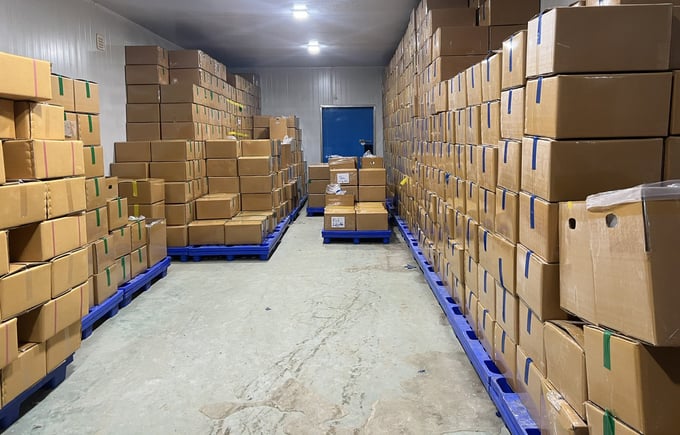
Frozen durian will contribute about 20% of the industry’s total export output. Photo: Quang Yen.
Fresh durian products have historically been subject to stringent regulations regarding product appearance and quarantine measures. Approximately 70% of fresh durian from a well-managed orchard meets the standards for export. Consequently, the remaining product can be frozen and skinned for export.
“In the past, Vietnam has primarily benefited from its potential and advantages in the export of raw materials. The value of export products will be enhanced and the export forms will be diversified through the use of processing methods such as freeze-drying or chilling. Furthermore, the consumption of agricultural products has been influenced by their seasonal production. Businesses can proactively store and supply frozen products during prime market periods, such as holidays, Tet, or off-seasons”, Ms. Men stated.
Many businesses are presently preparing dossiers to obtain cold storage export codes to comply with export standards, as per Ms. Men. “The durian industry’s overall export revenue will be significantly impacted by frozen exports. Freezing can assist in resolving the issues of seasonality and quality control, which have been a challenge for fresh fruits”.
Mr. Vu Duc Con, Chairman of the Dak Lak Durian Association, stated that fresh durian exports presently comprise approximately 60% of Vietnam’s total production. Consequently, approximately 40% of durian must be consumed domestically or undergo thorough processing.
Consequently, the industry’s proportion could increase by approximately 20% if Vietnam is permitted to export frozen durian on a formal basis. Therefore, Vietnam could export over 80% of its durian production to the Chinese market by combining fresh and frozen exports.
“Freezing will allow for better quality control, starting from the packaging process, ensuring that products do not violate the import standards of other countries,” Mr. Con stressed.
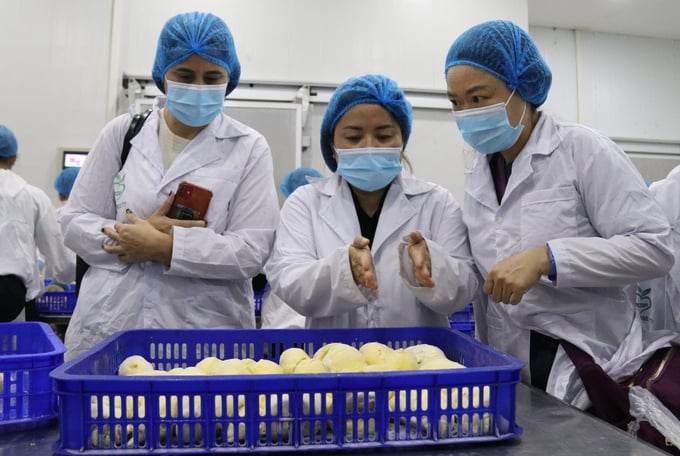
Enterprises are preparing documents to apply for a cold storage code for export. Photo: Quang Yen.
The Chairman of the Dak Lak Durian Association has stated that frozen exports will generate additional distribution channels, diversify markets, and offer a greater variety of processing options. This will attract numerous investment projects and simplify logistics connections abroad. Consequently, Vietnam will be less reliant on the season if it transitions to the processing of frozen durian to satisfy deep processing requirements, which will increase the competitiveness of Vietnamese durian in the global market, according to Mr. Con.
Agriculture News | Agri Products Price



